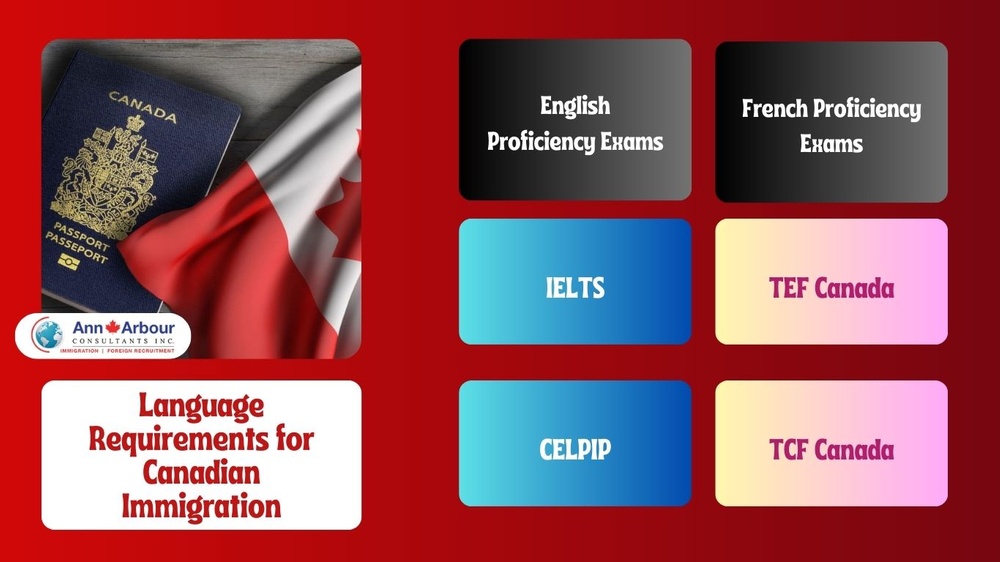Language Requirements for Canadian Immigration: Tips for English and French Proficiency Exams

Language Requirements for Canadian Immigration: Tips for English and French Proficiency Exams
For individuals aspiring to immigrate to Canada, language proficiency plays a vital role in the immigration process. Canada is a bilingual country with English and French as its official languages. The ability to communicate effectively in either English or French is crucial for successful integration into Canadian society. To ensure prospective immigrants possess the necessary language skills, the Canadian government has established language requirements that must be met for various immigration programs. In this blog, we will explore the language proficiency exams accepted for Canadian immigration, along with some valuable tips to help you excel in these exams.
1. English Proficiency Exams
For most Canadian immigration programs, applicants are required to demonstrate their proficiency in English by taking one of the following language exams:
a. International English Language Testing System (IELTS):
IELTS is one of the most widely recognized English language tests in the world. It assesses your listening, reading, writing, and speaking skills. Scores are measured on a scale from 0 to 9, with higher scores indicating better proficiency. To meet the language requirements, you typically need a minimum score of 5.0 or higher in each language skill.
b. Canadian English Language Proficiency Index Program (CELPIP):
The CELPIP exam evaluates your English language abilities specifically for Canadian immigration purposes. It measures your functional language proficiency in speaking, listening, reading, and writing. Like IELTS, scores are reported on a scale from 1 to 12, with a minimum score of 5 or 6 required, depending on the immigration program.
Tips for Excelling in English Proficiency Exams:
- Practice Regularly: Consistent practice is key to improving your language skills. Dedicate time each day to reading, writing, listening, and speaking in English. Engage with a variety of materials, such as newspapers, podcasts, and movies, to expose yourself to different language styles.
- Take Sample Tests: Familiarize yourself with the format and types of questions in the exam by taking sample tests. This will help you build confidence and identify areas that require improvement.
- Join Language Classes: Consider enrolling in English language classes or hiring a tutor to receive personalized guidance and feedback on your language development.
- Immerse Yourself in the Language: Surround yourself with English speakers or join language exchange programs to practice conversational skills and gain exposure to real-life language usage.
2. French Proficiency Exams
If you are applying for immigration programs that require proficiency in French, you must take one of the following exams:
a. Test d'évaluation de français (TEF Canada):
TEF Canada is a widely recognized French language proficiency exam accepted by the Canadian government. It assesses listening, speaking, reading, and writing skills. The results are reported on a 7-level scale, with levels 5 or 6 generally required for immigration purposes.
b. Test de connaissance du français (TCF Canada):
The TCF Canada exam evaluates general French language proficiency and is also used for immigration purposes. It assesses your ability to understand, speak, read, and write in French. The scoring system is based on six levels, and you will typically need to achieve level B1 or B2 for immigration purposes.
Tips for Excelling in French Proficiency Exams:
- Immerse Yourself in French Culture: Surround yourself with the French language by listening to French music, watching French movies, and practicing conversations with native speakers or language partners.
- Take Language Courses: Enroll in French language courses or find online resources that offer structured lessons to improve your grammar, vocabulary, and overall language proficiency.
- Practice Writing and Speaking: Regularly practice writing essays or short paragraphs in French, and engage in conversations to improve your speaking skills.
- Use Language Apps: Language learning apps can be valuable tools for practicing vocabulary, grammar, and listening comprehension in an interactive manner.
Meeting the language requirements for Canadian immigration is a critical step toward a successful application. Whether you choose English or French, it's essential to dedicate time and effort to enhance your language skills. Remember, language proficiency not only boosts your chances of immigration success but also helps you integrate smoothly into Canadian society, enhancing your overall experience as a new immigrant. Take advantage of the tips mentioned in this blog, and best of luck on your language proficiency journey!
Sharmila Perera
RCIC R417167
CEO and President of Ann Arbour Immigration Consultants Inc